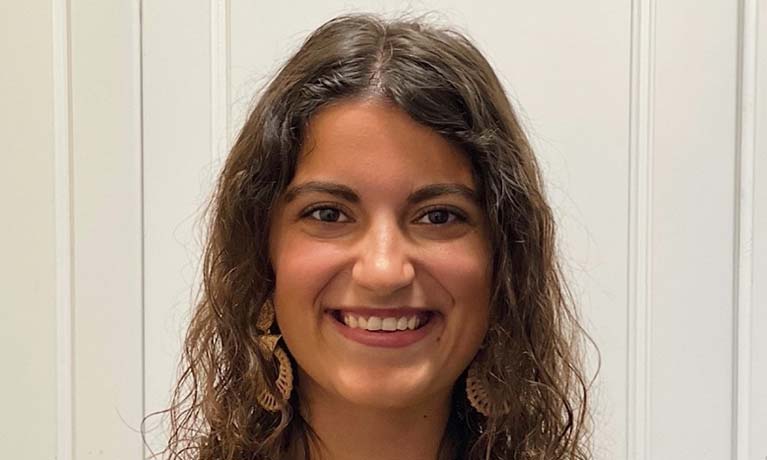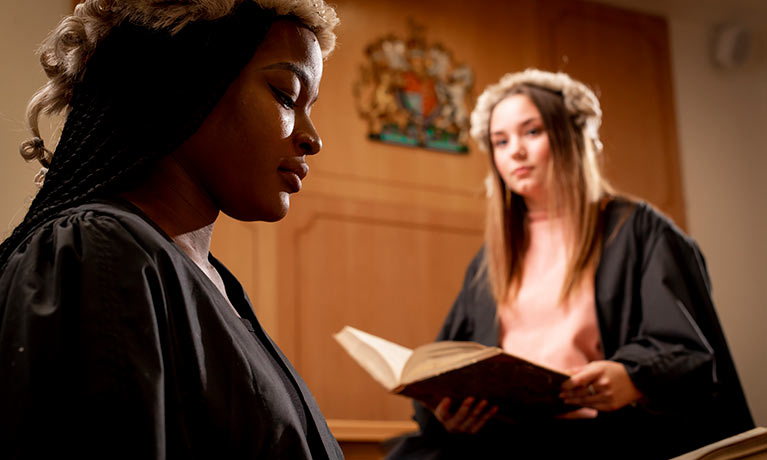Search
International Law LLB (Hons)
Study level: Undergraduate
The globalisation of commerce and trade, along with international political co-operation, requires us to take a globalised view of the law. This course explores domestic and international law, as well as the mechanisms of the international legal system.
Course features
Year of entry
Location
Coventry University (Coventry)
Study mode
Full-time
Sandwich
Online/Blended
Duration
3 years full-time
4 years sandwich
Condensed first year available
Course code
M224
Start date
January 2026 - condensed
Course overview
The International Law LLB (Hons) course explores the role of law within a globalised society, whilst providing you with a foundational understanding of the law in England and Wales. In doing so, the course aims to prepare globally aware leaders in law.
The course aims to help you:
- acquire knowledge and understanding of legal doctrines, concepts, principles, rules and values in the core areas of law and the specialist areas of international law.
- develop an appreciation of the context in which law operates, and an understanding of the dynamic nature of law, its uncertainty, the need for reform and proposals for such reform.
- develop the ability to apply the legal knowledge and skills acquired to both the theory and practice of law within a domestic and global law context.
The January start for this course is condensed in Year 1. Please see the ‘How you’ll learn’ section below for more details.
Rated Gold Overall
Teaching Excellence Framework (TEF) 20235 QS Stars for Teaching and Facilities
QS Stars University RatingsTop 5 Student City in England (Coventry)
QS Best Student Cities Index 2026Why you should study this course
- Engage with students at other international universities and industry experts through initiatives like our Collaborative Online International Learning (COIL) projects2.
- Explore the law in other jurisdictions through opportunities like our international field trips2.
- Submit your legal writing to be considered for publication, alongside other expert legal academics and professionals.
- Apply to volunteer in the Employment Law Clinic, Welfare and Benefits Advocacy clinic and Health Justice Partnership Clinic at the Coventry Law Centre. Selected students can gain practical legal experience under the supervision of trained solicitors and lawyers2.
- Grow your networks and get to know members of the legal industry through our 'Raising the Bar' scheme.
Accreditation and professional recognition
The degree is accredited1 and recognised by the following bodies:

International Law LLB is a recognised degree1 by the Chartered Institute of Legal Executives (CILEX). Any graduates of this course that pass the optional third year modules ‘Family Law’, or ‘Company Law’ and ‘Employment Law’, will not need to pass the CPQ Foundation stage or CPQ Advanced stage assessments and as such are capable of being recognised as CILEX Advanced Paralegals. Those who do not complete either ‘Family Law’ or ‘Company Law’ and ‘Employment Law’ will still be exempt from the mandatory aspects of CPQ Advanced stage. On completion of your course, you will have the option to pay £400 for CILEX recognition.
Memberships
Coventry Law School is currently a member of the International Association of Law Schools, an association of around 250 law schools from over 60 countries, representing around 12,000 law faculty members. Having this status allows you to access a variety of international experiences, including with our partner institutions across the world.
Coventry Law School is also currently a member of the European Law Faculties Association with over 150 members from Europe and beyond.
Memberships are reviewed on an annual basis and are not guaranteed. Applicants and students will be informed of any changes as soon as possible1.
Collaborations
Central England Law Centre
Coventry Law School collaborates with the Central England Law Centre in order to offer a professional element to your learning, through our Law Employment and Advocacy clinics. Students who are selected to participate in the clinics get involved with many aspects of what the solicitors do at the Law Centre, with supervisors who are currently working in practice and experts in specific areas of law. They get hands-on experience doing reserved legal activities, providing supervised advice and assistance to members of the public.
Law QWE
Coventry Law School also collaborates with Law QWE, a careers portal that connects individuals in search of qualifying work experience with top employers to support their route to qualification.
Breathing life into the law
Law students joined forces with journalism, paramedic and acting students as a dramatic court case gave them hands-on, industry-relevant experience.The lecturers are very passionate, committed and dedicated to helping students reach their full potential. They are brilliant professionals who show a genuine sense of care toward students. The CLS team is always willing to guide us throughout the course and to help us tackle any issue we may be facing both academic and personal. The teaching staff encourage us to think creatively, critically and independently. We can put our knowledge into practice during guided group sessions. The tutors are happy to give feedback and to discuss any gap, providing us with insightful opinions.
Caroline Teixeira Gouveia, International Law LLB, 2022

What you'll study
We regularly review our course content, to make it relevant and current for the benefit of our students. For these reasons, course modules may be updated.
How you'll learn
The International Law LLB (Hons) degree has been designed so that it is capable of satisfying the academic component of Bar training as required by the Bar Standards Board. For further details of the requirements of the academic component of Bar training, please visit the Bar Standards Board website.
The course is delivered through a combination of live/asynchronous lectures, workshops, online activities and directed readings.
Lectures tend to be expository in nature, introducing you to basic concepts and core principles. Workshops provide you with the opportunity to deepen your understanding of the subject matter through active exploration of legal issues, for example through debates, discussions, presentations, and other practical activities. Teaching sessions are designed to be interactive and may involve exploring real-world and hypothetical problems, considering case studies and analysing contemporary or more theoretical legal issues. This interactive approach enables you to develop your legal skills throughout our degree and immerse yourself in authentic legal experiences.
Throughout the course, your learning will be supported through Aula, our mobile-first virtual learning environment and you will receive specialist training in the use of a variety of legal databases (our online learning platform is subject to change).
If you choose to start this course in January it will be run as a condensed programme. You’ll start your course in January and finish your first year in August. Upon successful completion of Year 1, you will progress onto Year 2 in September and then continue to start subsequent years of your course in September, completing your degree at the same time as the September starters unless you opt to do a placement year.
Teaching contact hours
As a full-time undergraduate student, you will study modules totalling 120 credits each academic year. A typical 20 credit module requires a total of 200 hours study. This is made up of teaching contact hours, guided and independent study.
Teaching hours:
Teaching hours vary each semester, year of study and due to module selection. During your first year you can expect 15-18 teaching hours each week. You will also have the option to attend optional sessions including time with a progress coach or to meet with staff for advice and feedback. As you progress through your studies, teaching hours may reduce.
Guided and Independent study:
Throughout your studies, you will be expected to spend time in guided and independent study to make up the required study hours per module. You’ll be digging deeper into topics, review what you’ve learned and complete assignments. This can be completed around your personal commitments. As you progress through your studies, you’ll spend more time in independent study.
Online learning:
As an innovative university, we use different teaching methods including online tools and emerging technologies. So, some of your teaching hours and assessments may be delivered online.
Assessment
This course will be assessed using a variety of methods which will vary depending upon the module.
Assessment methods include:
- courseworks
- portfolios
- reports
- presentations
- practical assessments
- exams
- multi-choice quizzes
- phase tests.
The Coventry University Group assessment strategy ensures that our courses are fairly assessed and allows us to monitor student progression towards achieving the intended learning outcomes.
International experience opportunities
Throughout the International Law LLB degree we aim to expose you to a wide variety of international opportunities2. From undertaking an international field trip to working with students from international universities in a Collaborative International Online Learning project, we aim to offer an international opportunity for everyone. The Law School has particularly strong links with the Southwest University of Political Science and Law in Chongqing, China and established links with the University of Stellenbosch in South Africa, the University of Nebrija in Madrid.
Throughout the course, you will explore international law in detail and will develop cognisance of diverse cultural and global perspectives. The Law School is a diverse community of legal academics and students, which brings depth and vibrancy to your student experience.
Please note that all international experience opportunities may be subject to additional costs, competitive application, availability and meeting applicable visa and travel requirements are therefore not guaranteed2.
What I enjoy the most is that in seminars we can always share our thoughts freely with the tutor and he or she are always open to the discussion about any aspect of a relevant subject. For them, no question is ever too big or too small. Being able to engage in the discussion greatly improves my learning experience and helps me to understand some issues in a deeper, more critical way.
Piotr Krasienko, International Law LLB Graduate, 2022

The International Law LLB programme will provide you with the opportunity to gain a strong foundational knowledge of international law, developing the necessary skills to engage with some of the most significant legal challenges in an ever more globalised society.
Dr Andrew Jones, Lecturer in Law, 2022

Entry requirements
Typical entry requirements:
Fees and funding
| Student | Full-time | Part-time |
|---|---|---|
| UK, Ireland*, Channel Islands or Isle of Man | £9,535 per year | Not available |
| EU | £9,535 per year with EU Support Bursary** £16,800 per year without EU Support Bursary** |
Not available |
| International | £16,800 per year | Not available |
If you choose to study this course with a professional placement2 or study abroad year, you will need to pay a tuition fee3 to cover your academic support throughout your placement year. Students commencing their professional placement in the academic year 2027/28 will pay £1,500 if they are paying UK fees, or £1,800 if they are paying international fees.
For advice and guidance on tuition fees and student loans visit our Undergraduate Finance page and see The University’s Tuition Fee and Refund Terms and Conditions.
The University will charge the tuition fees that are stated in the above table for the first Academic Year of study. The University will review tuition fees each year. For UK (home) students, if Parliament permits an increase in tuition fees, the university may increase fees for each subsequent year of study in line with any such changes. Note that any increase is expected to be in line with inflation.
If you choose to study this course with a professional placement, the University will charge the tuition fees stated above for those on a placement during Academic Year 2027/28. The University will review professional placement tuition fees each year. For UK (home) students, the University may increase fees for each subsequent year of study, but such that it will be no more than 5% above inflation.
For international students, we may increase fees each year, but such increases will be no more than 5% above inflation. If you defer your course start date or have to extend your studies beyond the normal duration of the course (e.g. to repeat a year or resit examinations) the University reserves the right to charge you fees at a higher rate and/or in accordance with any legislative changes during the additional period of study.
We offer a range of International scholarships to students all over the world. For more information, visit our International Scholarships page.
Tuition fees cover the cost of your teaching, assessments, facilities and support services. There may be additional costs not covered by this fee such as accommodation and living costs, recommended reading books, stationery, printing and re-assessments should you need them. Find out what's included in your tuition costs.
The following are additional costs not included in the tuition fees:
- Any optional overseas field trips or visits: £400+ per trip.
- Any costs associated with securing, attending or completing a placement (whether in the UK or abroad).
Other additional costs
- On completion of your course, you will have the option to pay £400 for CILEX recognition, if you successfully pass either ‘Family Law’ or ‘Company Law’ and ‘Employment Law’. This means you will not need to pass the CPQ Foundation stage or CPQ Advanced stage assessments and as such are capable of being recognised as CILEX Advanced Paralegals.
Condensed course – January start date
If you choose to start this course in January please make sure you check the Fees and Finance page for more information. Although starting this course in January does not prohibit you from being eligible for student finance, the way it is paid in your first year differs from those who start their course in September.
If you start the course in January, your tuition fees will be paid in accordance with the university’s Tuition Fees, Refund and Withdrawal Terms and Conditions for January starters and for any further years of study, your fees will be paid in accordance with the terms for September starters.
*Irish student fees
The rights of Irish residents to study in the UK are preserved under the Common Travel Area arrangement. If you are an Irish student and meet the residency criteria, you can study in England, pay the same level of tuition fees as English students and utilise the Tuition Fee Loan.
**EU Support Bursary
Following the UK's exit from the European Union, we are offering financial support to all eligible EU students who wish to study an undergraduate or a postgraduate degree with us full-time. This bursary will be used to offset the cost of your tuition fees to bring them in line with that of UK students. Students studying a degree with a foundation year with us are not eligible for the bursary.
Facilities
The International Law LLB course is delivered at the main Coventry University campus, where you'll benefit from our dedicated law facilities4.

Moot Room
Our Moot Room gives you the opportunity to develop those vital and practical legal skills. You can practise your legal skills in a realistic setting, as well as having the chance to take part in mooting competitions.

Legal Clinic
Use the Legal Clinic to develop your practical legal skills and help you stand out in your future career. You will have access to 'real' clients and work alongside trained solicitors and lawyers.

Routes into a Legal Career
Find out more about how Coventry University can kick start your legal career through our preparation courses.
Careers and opportunities
Upon successful completion of this course you will be able to:
- critically analyse theories, concepts and principles of laws across diverse substantive legal areas, appreciating the role of law within a globalised context.
- appreciate and apply principles of sustainability, social responsibility and professional ethics, whilst being cognisant of diverse cultural and global perspectives.
- identify and synthesise relevant information from primary and secondary legal sources, using both digital and non-digital resources, whilst adhering to principles of academic integrity.
- draw reasoned conclusions through the application of legal principles and knowledge to complex problems, whilst tolerating ambiguity and recognising alternative legal outcomes.
- communicate effectively and professionally, by conveying and explaining legal information, ideas and arguments appropriately in a variety of contexts.
- demonstrate self-management and work independently or collaboratively as appropriate.
- demonstrate intellectual independence through the acquisition of specialist knowledge and understanding of current legal thinking and emerging research.
- apply a range of practical or clinical legal skills, including those applicable in an international context.
Law graduates can pursue a wide variety of careers both in the UK and overseas. Many graduates enter the legal profession as solicitors, barristers, paralegals or legal executives (additional education/courses and training required). However, the skills learned are also transferrable to career paths outside of law such as recruitment, management, teaching or finance. Many of our law graduates also go on to pursue a career in academia or undertake further academic study.
Where our graduates work
Previous law graduates from Coventry Law School have gone on to work at a wide variety of organisations and firms including:
- DAC Beachcroft
- NFU Mutual
- PwC
- Deloitte
- Linklaters
- Countrywide Tax and Trust Corporation
- Oracle
- Squire Patton Boggs
- Stobbs
- Co-op Legal Services

Discover Phoenix+
Phoenix+ brings you together with other students to learn, experience and develop essential knowledge and skills. Whatever destination you choose, it's about preparing you for life after university.
Learn more about Phoenix+How to apply
You may also like

Criminal Law and Justice LLB (Hons)

Commercial Law LLB (Hons)






